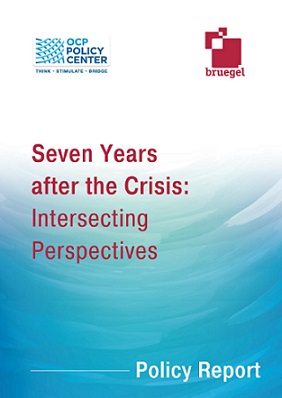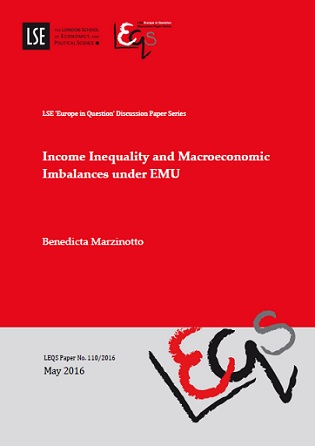Bluedorn, John C., Ebeke, Christian, (2016), “Sluggish Business Investment in the Euro Area: The Roles of Small and Medium Enterprises and Debt”, iMF-direct, 4 Αugust Small businesses could be the lifeblood of Europe’s economy, but their size and high debt are two of the factors holding back the investment recovery in the euro area. The solution partly lies in policies to help firms grow and reduce debt. Our new study, part …Read More
Explaining Non-Performing Loans in Greece: A Comparative Study on the Effects of Recession and Banking Practices
Monokroussos, Platon, Thomakos, Dimitrios D., Alexopoulos, Thomas A., (2016), “Explaining Non-Performing Loans in Greece: A Comparative Study on the Effects of Recession and Banking Practices”, LSE, Αugust Using a new dataset of macroeconomic and banking-related variables we attempt to explain the evolution of “bad” loans in Greece over the period 2005-2015. Our findings suggest that the primary cause of the sharp increase in non-performing loans (NPLs) following the outbreak of the …Read More
The glass is still half-empty: Eurozone stability under threat of a ‘bad shock’
Micossi, Stefano, (2016), “The glass is still half-empty: Eurozone stability under threat of a ‘bad shock’”, Voxeu, 20 Αugust Some economists are approaching a consensus that the Eurozone’s financial architecture is now resilient enough to withstand another shock similar to that of 2010-11. This column argues that such a view may be overly optimistic. Economic and financial instability persists in member states and the banking sector, and institutions to tackle a …Read More
The ECB’s Negative Rate Policy Has Been Effective but Faces Limits
Jobst, Andy, Lin, Huidan, (2016), “The ECB’s Negative Rate Policy Has Been Effective but Faces Limits”, iMF-direct, 10 Αugust More than two years ago, seeking to revive a moribund economy, the European Central Bank (ECB) embarked on a new monetary policy measure: charging interest on excess liquidity that banks held at the central bank. The move complemented a series of other easing measures aimed at bringing inflation back to the ECB’s …Read More
Seven years after the crisis: intersecting perspectives
Berahab, Rim, Boot, Nuria,Dadush, Uri, El Aynaoui, Karim, El Mokri, Karim, Tagliapietra, Simone, Wilson, Karen E., Wolff, Guntram B., Zachmann, Georg, (2016), “Seven years after the crisis: intersecting perspectives”, Bruegel, 19 Αugust This joint publication brings together the papers produced as part of the first collaboration between Bruegel and the OCP Policy Center. Within the theme of “Seven Years after the Crisis: Intersecting Perspectives” our two organisations launched a “Platform for Advanced & Emerging Economies Policy Dialogue” in Rabat on 1 April …Read More
Is The Nation-State And Its Welfare State Dead? A Critique Of Varoufakis
Navarro, Vicente, (2016), “Is The Nation-State And Its Welfare State Dead? A Critique Of Varoufakis”, Social Europe, 4 Αugust I always read the writings of Mr. Varoufakis with great interest, and I frequently find myself in agreement, particularly in his criticism of the Troika (the International Monetary Fund, European Commission, and European Central Bank) and of the Eurogroup (the Ministers of Economy and Finances of the European Union). I also …Read More
Unity in diversity: The way forward for Europe
Feld, Lars, Schmidt, Christoph, Schnabel, Isabel, Wieland, Volker, (2016), “Unity in diversity: The way forward for Europe”, Voxeu, 22 Αugust It has been suggested that the vote for Brexit marks the first step of disintegration in Europe. This column argues that if the European integration process is pursued wisely, it still carries the promise of enduring peace and growing prosperity. But EU policymakers must devise a process of integration that strengthens …Read More
The Euro Area Workforce is Aging, Costing Growth
Aiyar, Shekhar, Ebeke, Christian, Shao, Xiaobo, (2016), “The Euro Area Workforce is Aging, Costing Growth”, iMF-direct, 17 August In parallel to the aging of the general population, the workforce in the euro area is also growing older. This could cause productivity growth to decline in the years ahead, raising another policy challenge for governments already dealing with legacies from the crisis such as high unemployment and debt. Relevant Posts Barslund, Mikkel, Busse, Matthias, …Read More
The meaning of extension for the stability of collective bargaining in Europe
Schulten, Thorsten, (2016), “The meaning of extension for the stability of collective bargaining in Europe”, ETUI Policy Brief No 4/2016 Although union densities have fallen markedly almost everywhere in Europe over recent decades, many European countries still have particularly high and stable levels of binding collective bargaining coverage. The main reason is State support for collective bargaining systems. A central feature of this is the instrument of the declaration of general …Read More
Income Inequality and Macroeconomic Imbalances under EMU
Marzinotto, Benedicta, (2016), “Income Inequality and Macroeconomic Imbalances under EMU”, LSE, Μay This paper explains the build-up and reversal of euro area macroeconomic imbalances by considering the interaction between the underlying income distribution in each country and EMU-induced financial liberalization. The argument is that the sharp increase in money supply since the early 1990s had the effect of relaxing collateral constraints for illiquid lowerincome groups, whilst having no specific impact on …Read More






